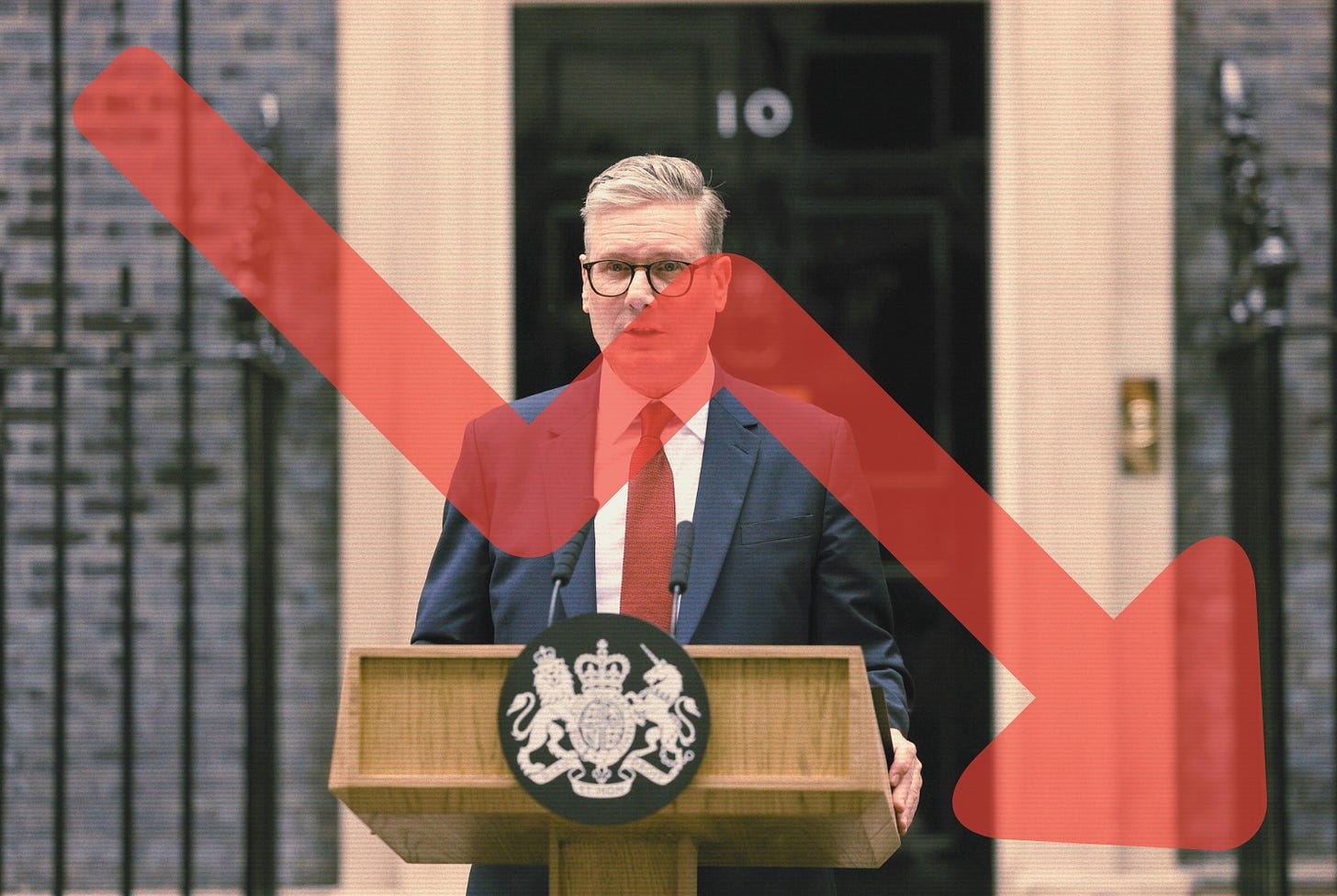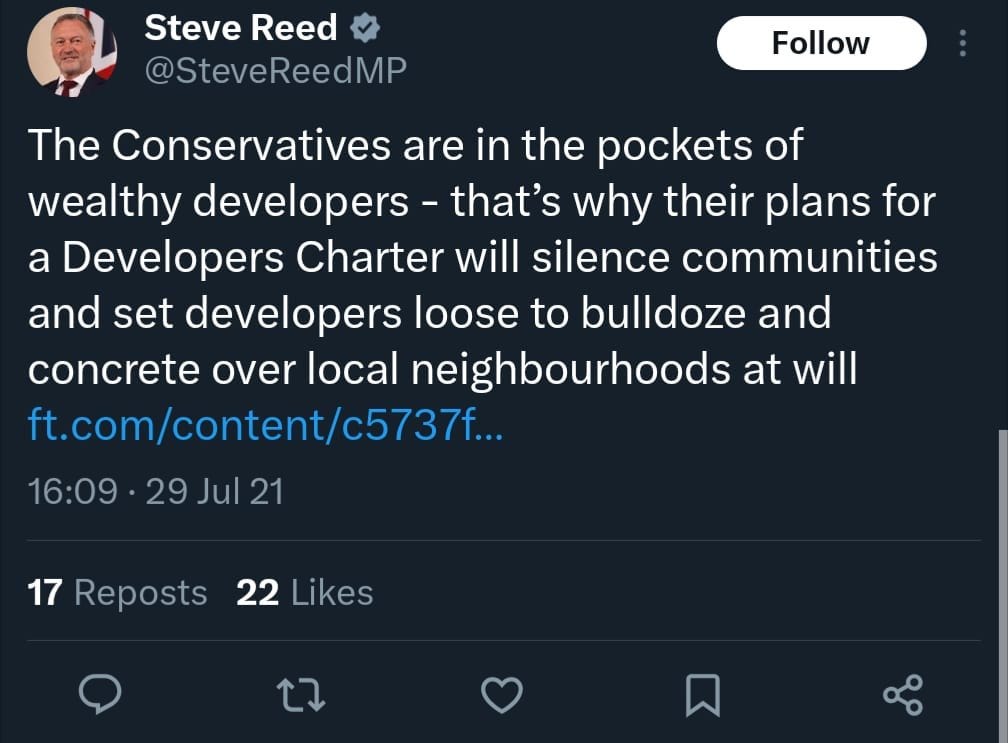Terminal Starmer
Reflections on the beginning of the end for the Prime Minister
Angela Rayner's resignation for underpaying Stamp Duty has triggered a cabinet reshuffle and a deputy leadership contest. My overwhelming feeling is that Starmer has entered 'Phase 2' of his government terminally weakened – and for reasons that reveal much about his failings in office.
An Uninspiring Reshuffle
Only six members of the new Starmer cabinet are in the same post as a year ago. This level of change so early on is unprecedented – all of Blair, Brown, Cameron, May, Johnson, and Sunak kept their cabinets mostly the same throughout their early years in office. The most striking fact about Friday's reshuffle is how few ministers have actually departed: only Lucy Powell and Ian Murray have returned to the backbenches.
Perhaps the Prime Minister feels he picked the right people last June but gave most of them the wrong brief – which would say something grim about his judgement.
“The less charitable conclusion is that Starmer judged much of his cabinet to be underperforming but, out of weakness, has simply given them other departments to fail in.”
But it still doesn’t feel like Starmer has the cabinet he wants. Few have been impressed with Yvette Cooper’s performance, yet despite her lack of foreign policy experience she finds her way to the Foreign Office. Not a weekend has gone by without briefings against Bridget Phillipson and Lisa Nandy, yet both remain in place.
The less charitable conclusion is that Starmer judged much of his cabinet to be underperforming but, out of weakness, has simply given them other departments to fail in. This reshuffle is the worst of all worlds – radical shifts of portfolio mean more time lost as civil servants train up new ministers, while many who have failed to deliver still remain in power.
The answer is that Starmer has burnt through much of his political capital and built the reshuffle around the moves of Shabhana Mahmood to the Home Office and David Lammy to Deputy PM/Justice. Both have been bright spots in an otherwise troubled ministry. Lammy has been an effective Foreign Secretary in an unstable world and he deserves a lot of credit for the links he has built with the Trump administration, particularly JD Vance – not easy given his political background.
Mahmood has shown at Justice that she is willing to take tough decisions and make trade-offs in pursuit of strategic goals – releasing inmates early to free up capacity, launching the UK’s first prison construction strategy in decades, and authorising the use of tasers to control disorder. Whatever one thinks of the measures, she has acted where most ministers have done little.
She is also determined to deal with illegal migration. Her move to the Home Office suggests Starmer believes his fate is closely tied to stopping the small boats. This is true – public concern about immigration, even amongst liberals and progressives, is at a multi-year high. But Mahmood will need to be empowered to act, and it remains to be seen whether Starmer has the stomach for the fight.
Bright spots aside, the reshuffle left a sour taste – especially coming days after the departure of Starmer's third communications director in a year. It suggests a Prime Minister who believes that if he could just find the right mix of ministers and advisers he will solve all his problems. But this is no substitute for strategic direction from the top.
Politics is the art of the possible. Successful Prime Ministers pick priorities and make trade-offs. Starmer just moves people and policies around hoping something will come up – an approach that hasn't worked for the last year and won't start working now.
A Factional Contest Awaits
The weekend papers report that the Government wants to put up its own candidate in the deputy leadership contest. Given the anti-government mood amongst the membership – and increasingly on the Labour backbenches – this risks public humiliation for whoever stands. Shabhana Mahmood and David Lammy are being considered, but why risk weakening with defeat, two of the Cabinet's more effective ministers just as they're getting to grips with crucial new roles?
Some have compared the situation to 1981, when Tony Benn's challenge to Denis Healey sparked a bitter fight for the soul of the Labour party. The crucial difference now is that party rules are far less favourable to the left. Thanks to changes Starmer pushed through in 2021, candidates need 20% of Labour MPs plus significant support from unions, affiliates and CLPs – the former being impossible for anybody on the Corbynite left.
“Why risk weakening with defeat, two of the Cabinet's more effective ministers just as they're getting to grips with crucial new roles?”
What follows is likely to be a battle between soft-left factions. These fans of Ed Miliband and Andy Burnham have little time for Corbyn but were dismayed at the Government's attempts to cut welfare and means-test the winter fuel allowance.
The candidates likely to run are Rosena Allin Khan – who came second in 2020 and was recently stripped of her role as a trade envoy in protest at welfare cuts – Emily Thornberry – Shadow Attorney General in opposition but excluded from Starmer’s first cabinet – and Louise Haigh – who resigned as Transport Secretary last November after it emerged she pled guilty to fraud in 2014.
Of these, Thornberry is the most pragmatic and the best parliamentary performer. Allin Khan has been a vocal critic but lacks ministerial experience. Haigh would surely return with similar baggage to that which Rayner has left with.
Whoever wins, the risk to Starmer is acute. The soft left has been cast out in the dark under him and has little to gain from his continued leadership. While there is no rule that says the Deputy Leader must be in Cabinet, it would be an unpopular decision to leave the victor on the backbenches. The contest will only add to the swelling ranks of Starmer-sceptics inside the administration.
The loss of Rayner also removes something of a shield for Starmer. Had the Prime Minister fallen she would almost certainly have replaced him, such was her support in both the PLP and party membership. Crucially though, there is a high threshold for forcing out a sitting Labour leader – 20% of MPs are needed to trigger a contest and the incumbent is automatically entitled to stand. Starmer could only really be pushed if multiple wings of the PLP withdrew support. While Rayner remained, rivals had a powerful incentive not to trigger a contest they knew they would lose.
Her departure means one less leadership rival for Starmer but it emboldens those who remain.
Bleak Mood On Housing
The new Housing Secretary, Steve Reed, is a Starmer loyalist with close ties to the PM’s Chief of Staff Morgan McSweeney. For the last year Reed has often been sent on the media round when the government is on the ropes – hence we’ve seen a lot of him.
Reed has faced criticism during his time as Environment Secretary, mainly over the poor state of Britain’s water sector – which he inherited – and for not standing up for farmers on agricultural inheritance tax – a Treasury decision. He did make some progress – announcing plans to abolish the failing water regulator Ofwat and boosting the Environment Agency’s budget through new charges on water firms. But he may not have had the time or money for a fair judgement.
For YIMBYs, Reed’s appointment can be read glass half-full or glass half-empty. He is a loyalist likely to bow to the Prime Minister and Treasury, both of whom want serious planning reform and more building. Unlike Angela Rayner, he has no chance of leading the party and so is more likely to keep his head down and get on with the job.
The negative take goes back to Reed’s time shadowing housing in the early 2019–24 Parliament, when he helped torpedo Boris Johnson’s planning reforms. Concern has centred on a now-deleted 2021 tweet accusing Johnson of pushing a “developer’s charter” that would gag local residents from objecting to applications.
But it’s easy to read too much into this – he was pushing the party line. Starmer didn’t begin to advocate planning reform until late 2022. Ultimately, Reed will do what No.10 and the Treasury tell him. The problem is that even as we enter “Phase 2” of the Starmer Government, the man himself isn’t clear about his priorities or how to achieve them.
This is underscored by the new faces at MHCLG: Alison McGovern – who has opposed building on the Green Belt – and Miatta Fahnbullen – a supporter of rent controls – join as junior ministers. If Starmer is sincere about planning reform, and I believe he is, his choice of deputies suggests he is pathologically prone to self-sabotage.
“Appointing a supporter of rent controls to the housing ministry is like putting a climate change sceptic in charge of net zero.”
Appointing a supporter of rent controls to the housing ministry is like putting a climate change sceptic in charge of net zero. The Housing Minister, Matthew Pennycook, is already a NIMBY. The new appointments deliver a blockers’ majority in the department.
Reed leaves me uninspired, the juniors leave me devoid of hope that Labour will solve the housing crisis or get Britain building. Just as much because of what they represent as what they might do in office. They embody the toxic thread running through the last week – indeed the last year – of a Prime Minister with no consistent strategy, no awareness of his coalition, and no ability to make the political weather.
I still think things are better than if the Conservatives had been re-elected (unlikely as that was). The Planning & Infrastructure Bill – despite U-turns – is a step forward, as are “grey belt” and last year’s NPPF changes. But new housing starts in the last year are down 17% and remain 27% below 2019 levels.
Labour have not come close to the radicalism needed to fix Britain’s building crisis: dismantling discretionary planning and replacing it with zoning, revisiting the Building Safety Regulator’s mandate, and ensuring housing targets are highest where demand is highest – not just where Labour doesn’t stand to lose.
There are only so many times a leader can blame ministers, advisers or comms. What if the problem isn’t Starmer’s messaging, but that he doesn’t actually have anything to say?
Thank you for reading Build Vector, if you’ve enjoyed this piece then please consider subscribing, it’s free and you have nothing to lose except a tiny portion of your life. You can find me on X @Jack_Nostalgic




